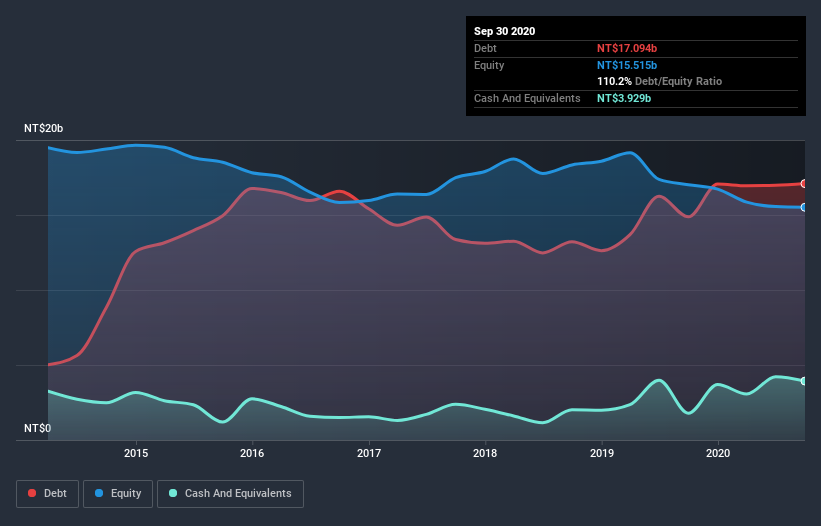Health Check: How Prudently Does Oriental Union Chemical (TPE:1710) Use Debt?

Legendary fund manager Li Lu (who Charlie Munger backed) once said, 'The biggest investment risk is not the volatility of prices, but whether you will suffer a permanent loss of capital.' It's only natural to consider a company's balance sheet when you examine how risky it is, since debt is often involved when a business collapses. Importantly, Oriental Union Chemical Corporation (TPE:1710) does carry debt. But the more important question is: how much risk is that debt creating?
When Is Debt Dangerous?
Generally speaking, debt only becomes a real problem when a company can't easily pay it off, either by raising capital or with its own cash flow. If things get really bad, the lenders can take control of the business. However, a more frequent (but still costly) occurrence is where a company must issue shares at bargain-basement prices, permanently diluting shareholders, just to shore up its balance sheet. Of course, the upside of debt is that it often represents cheap capital, especially when it replaces dilution in a company with the ability to reinvest at high rates of return. The first thing to do when considering how much debt a business uses is to look at its cash and debt together.
See our latest analysis for Oriental Union Chemical
What Is Oriental Union Chemical's Debt?
As you can see below, at the end of September 2020, Oriental Union Chemical had NT$17.1b of debt, up from NT$14.9b a year ago. Click the image for more detail. However, it also had NT$3.93b in cash, and so its net debt is NT$13.2b.

A Look At Oriental Union Chemical's Liabilities
We can see from the most recent balance sheet that Oriental Union Chemical had liabilities of NT$10.7b falling due within a year, and liabilities of NT$10.4b due beyond that. Offsetting these obligations, it had cash of NT$3.93b as well as receivables valued at NT$1.53b due within 12 months. So its liabilities total NT$15.6b more than the combination of its cash and short-term receivables.
This deficit is considerable relative to its market capitalization of NT$17.7b, so it does suggest shareholders should keep an eye on Oriental Union Chemical's use of debt. This suggests shareholders would be heavily diluted if the company needed to shore up its balance sheet in a hurry. The balance sheet is clearly the area to focus on when you are analysing debt. But it is future earnings, more than anything, that will determine Oriental Union Chemical's ability to maintain a healthy balance sheet going forward. So if you want to see what the professionals think, you might find this free report on analyst profit forecasts to be interesting.
In the last year Oriental Union Chemical had a loss before interest and tax, and actually shrunk its revenue by 33%, to NT$18b. To be frank that doesn't bode well.
Caveat Emptor
While Oriental Union Chemical's falling revenue is about as heartwarming as a wet blanket, arguably its earnings before interest and tax (EBIT) loss is even less appealing. To be specific the EBIT loss came in at NT$818m. When we look at that and recall the liabilities on its balance sheet, relative to cash, it seems unwise to us for the company to have any debt. Quite frankly we think the balance sheet is far from match-fit, although it could be improved with time. We would feel better if it turned its trailing twelve month loss of NT$632m into a profit. So we do think this stock is quite risky. There's no doubt that we learn most about debt from the balance sheet. But ultimately, every company can contain risks that exist outside of the balance sheet. For instance, we've identified 1 warning sign for Oriental Union Chemical that you should be aware of.
If, after all that, you're more interested in a fast growing company with a rock-solid balance sheet, then check out our list of net cash growth stocks without delay.
If you’re looking to trade Oriental Union Chemical, open an account with the lowest-cost* platform trusted by professionals, Interactive Brokers. Their clients from over 200 countries and territories trade stocks, options, futures, forex, bonds and funds worldwide from a single integrated account. Promoted
New: AI Stock Screener & Alerts
Our new AI Stock Screener scans the market every day to uncover opportunities.
• Dividend Powerhouses (3%+ Yield)
• Undervalued Small Caps with Insider Buying
• High growth Tech and AI Companies
Or build your own from over 50 metrics.
This article by Simply Wall St is general in nature. It does not constitute a recommendation to buy or sell any stock, and does not take account of your objectives, or your financial situation. We aim to bring you long-term focused analysis driven by fundamental data. Note that our analysis may not factor in the latest price-sensitive company announcements or qualitative material. Simply Wall St has no position in any stocks mentioned.
*Interactive Brokers Rated Lowest Cost Broker by StockBrokers.com Annual Online Review 2020
Have feedback on this article? Concerned about the content? Get in touch with us directly. Alternatively, email editorial-team (at) simplywallst.com.
About TWSE:1710
Oriental Union Chemical
Produces and sells ethylene oxide, ethylene glycol, and other related chemical products primarily in Taiwan and internationally.
Reasonable growth potential and fair value.
Similar Companies
Market Insights
Community Narratives



